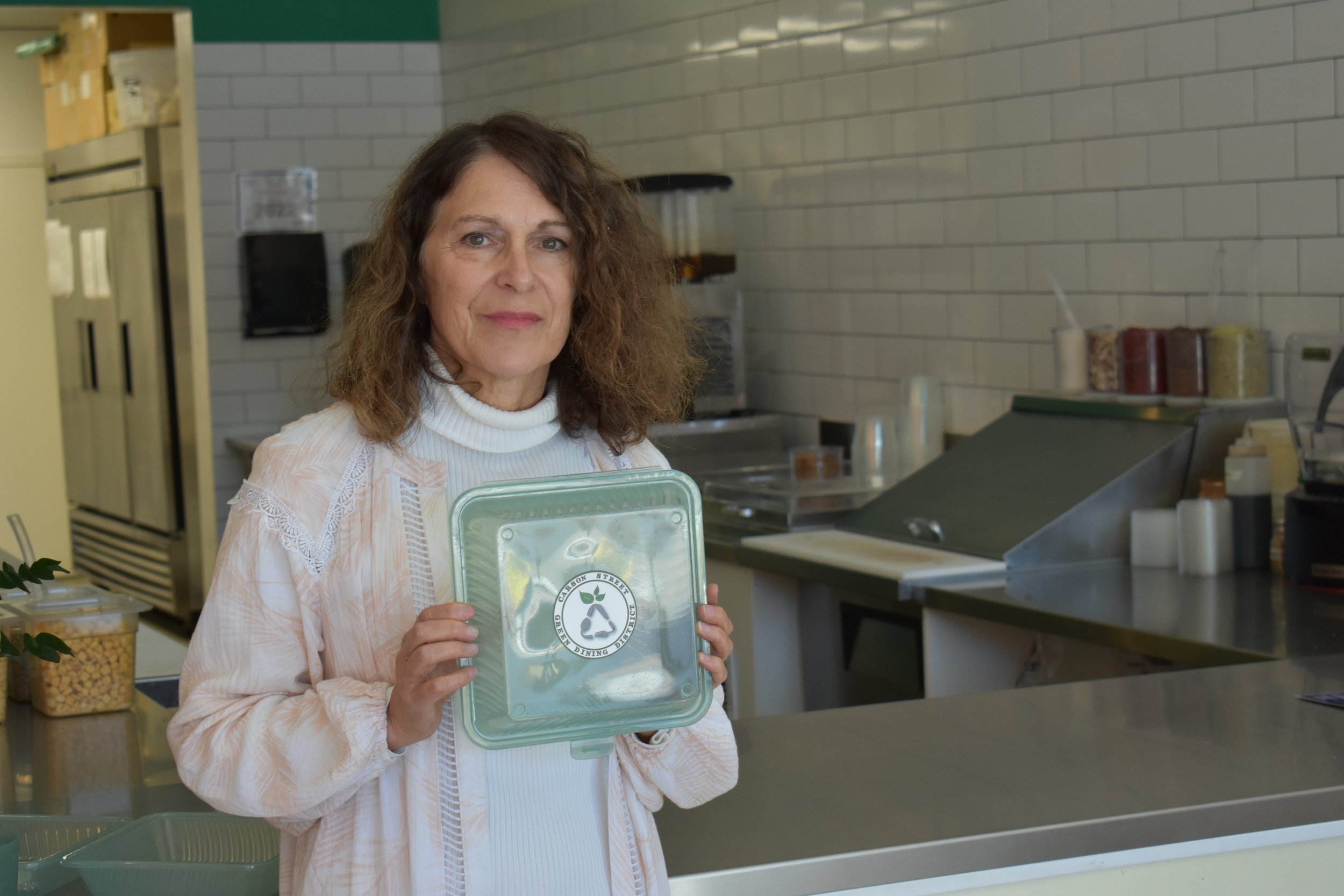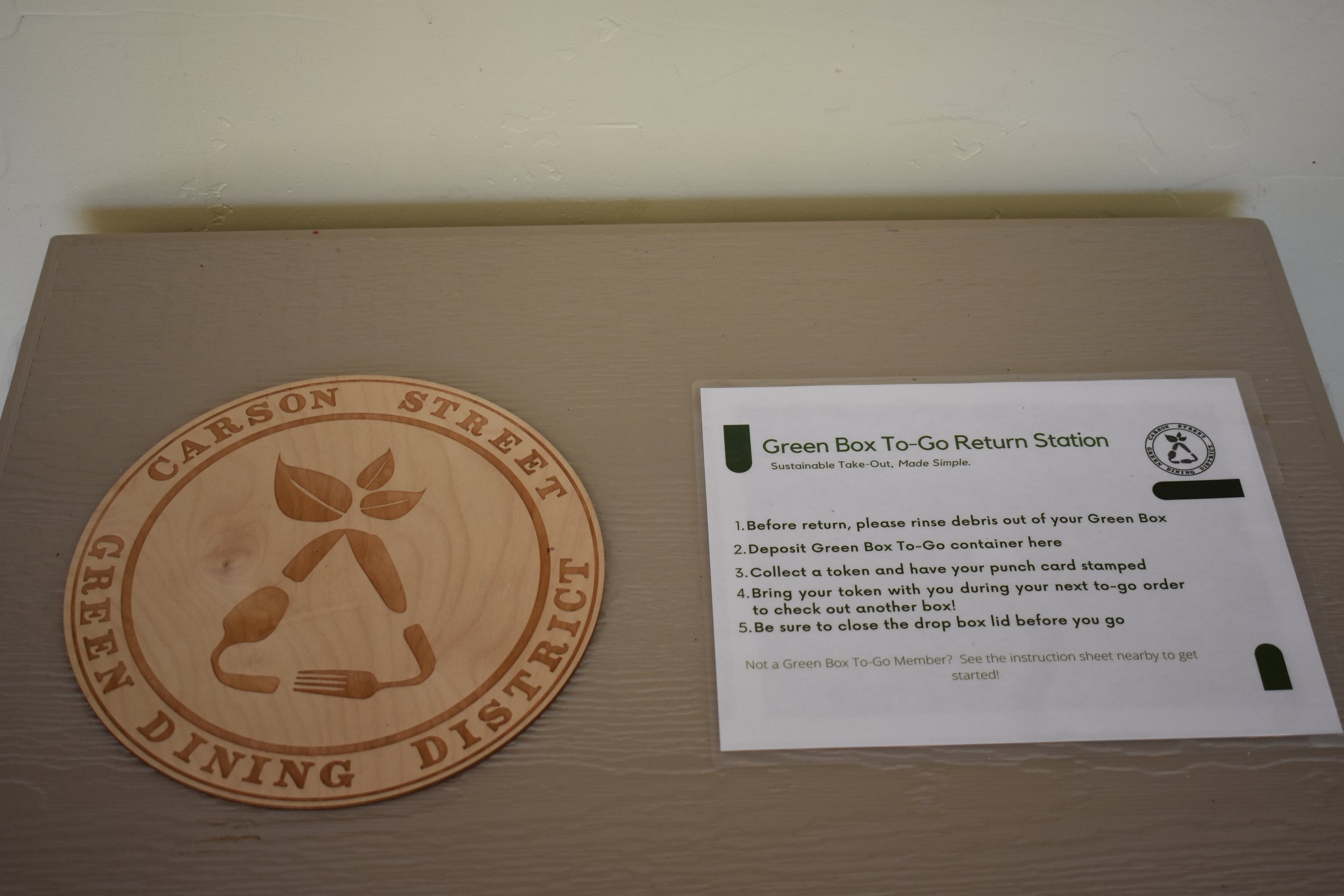“We’re looking for businesses with heart,” Donna Walden says of her drive to make our area greener, by looking for partnerships with local businesses to lessen their environmental damage. “They care about sustainability, they want to know what more they can do to help keep Nevada beautiful for future generations.”
In 2008, Walden founded greenUP! a 501(c)(3) an environmental non-profit organization operating out of Carson City. It was founded to pull together multiple environmentally inclined non-profits in the Reno-Tahoe region to create a coordinated environmental calendar, share information, and promote common initiatives. Since it began, greenUP! has worked in tandem with other organizations in Northern Nevada to encourage businesses to be more environmentally conscious and actively work towards reducing their waste output and resource consumption.
“Most recently, we’re known for our work with the Nevada Green Business Program and the Green Dining work that we’ve been doing,” Walden explained, listing some of her current initiatives. “We partnered with Western Nevada College to receive federal funding and funding from an environmental protection agency to start a Green Business Program for the state of Nevada.”
The coalition called The Nevada Green Business Program was officially started in 2019. They work with businesses at no cost and their services are provided for free. They assign a sector-specific checklist of best environmental practices that businesses can implement, and then provide assistance and resources to help them complete the checklist.
Once certified, greenUP! helps to promote these passed ‘green businesses’ throughout Nevada. “We’re targeting small to medium-sized businesses,” Walden said. “Big companies usually already have large sustainability teams, like Patagonia for example, and won’t learn anything new from us. So our sweet spot is those smaller businesses.”
Green Dining Nevada is hosting a Community Pledge and Mayoral Proclamation at 12:00 p.m. on October 11th, at the Wild River Grille in Reno. Community members can take a pledge to support sustainable dining, register to receive green dining tips and the first scoop on green events and notifications for new green-friendly restaurants.
The checklist for businesses wanting to improve their green conduct is sector specific, and they currently have 30 different versions available. “There’s pollution prevention, water, wastewater, transportation, energy, and solid waste,” Walden said. “Each category consists of a certain number of core and optional measures that they must do, or could do. Questions such as, ‘do you have a sustainability plan for your company?’ And if they don’t, we have a template they can use to create one.”
The Nevada Green Business Program consists of greenUP! and seven other partners: The Reno and Sparks Chamber of Commerce, the City of Reno, Envirolution, GreenACT Nevada, Keep Truckee Meadows Beautiful, Incline Village General Improvement District, and GRN Vision.
Walden points out that the Green Business Program also helps all of the partners “to build a database in order to collect environmental outcome measures.” The program utilizes an online platform called GreenBizTracker. This program not only makes it easier for businesses to go online, register, track their efforts, and become certified, it also allows the Nevada Green Business Network to collect and aggregate their data in order to measure outcomes from the practices being implemented. That data is then used to report the collective impact that the certified green businesses are having, and how that contributes toward the state of Nevada’s environmental goals.
The businesses greenUP! is currently working with “already have their mind set on sustainability,” Walden said. “Even though there are cost savings and benefits to the businesses, most of them are doing it because they want to do something to preserve the planet.”
Aside from helping protect the environment and fighting climate change, registering your business as a ‘green business’ can reap many rewards, Walden says. Implementing practices that reduce energy, water, and waste leads to utility cost savings, improves operational efficiency, and lowers maintenance costs to businesses.
Using non-toxic cleaning supplies protects the health and wellness of employees by improving the indoor air quality of workplaces. Walden also outlines the promotional benefits available to businesses who choose to go through the program: “businesses get to be listed on a nation-wide directory of green business programs,” she said. “If somebody is visiting Reno and wants to find a green restaurant, the directory is the first place they’ll look. We also do a lot to promote them other than that. We give them a window clean, a certificate, and lots of social media promo around the business.”
There is a growing trend of consumers wanting to buy from ‘green businesses’, with more than 70% of customers choosing to buy from businesses that are helping to protect the environment, and are even willing to pay more for their products. Donna elaborates: “there have been studies that show that ⅔ of all American consumers would pay more for a green brand, and worldwide, 80% of consumers would pay more at a green business. And that’s because our consumers care about the environment and they vote with their dollars. And also the workers, particularly the youth, care about working for a business that implements environmentally friendly practices.”
In 2019, greenUP! was awarded a $20,000 grant by the Nevada Division of Environmental Protection’s Recycling Program to launch a Green Dining District in Carson City (above). The goal of the program is to engage with restaurants along Carson Street to provide environmental education and lend support to sustainable business practices, such as reducing single-use plastics and composting food waste. The U.S. The Department of Agriculture estimates that the restaurant industry alone generates about 11.4 million tons of food waste annually, at a cost of about $25 billion a year.
One of the programs that greenUP! urges members of the Green Dining District to get involved with is their reusable container pilot. GreenUP! developed a green box to-go program, the first of its kind in the state of Nevada, to give a long overdue option to environmentally conscious businesses and customers who wish to be a part of solutions to waste reduction.
It replaces single-use disposable containers used for to-go orders with reusables ones, closing the loop on our consumption and preventing unnecessary waste from entering our landfills and communities.
“It’s like a library subscription,” Walden said of the program’s procedures. “You go to a restaurant, buy a token, and they’ll give you a box. You can take it home, eat your food, rinse it. When you next visit one of the participating restaurants, you’ll put it in a drop box there. The restaurant will then sanitize it and put it back into circulation.”
Currently, there are four restaurants in Carson City utilizing this program, and also both Squeeze In locations in Reno.
Great Full Gardens is one of the Reno restaurants participating in collaborative green efforts with greenUP! Photo provided by Great Full Gardens with permission to use.
“We’re looking to get more public support for this program,” Walden said. “The public just has to get used to it. It’s different, they haven’t heard of it. People think it is a good idea, they just need to take action. The concept of buying a token, and bringing the container back just isn’t currently a part of our culture. We have to start somewhere though.” Currently, the program is still in its pilot stage. However, Donna hopes that if more consumers and restaurants get on board and show interest, their goal would be to develop an app rather than using tangible tokens.
This year, greenUP! followed up on the Carson City initiative to get support from the Reno Sparks Chamber of Commerce to bring a so-called Green Dining District to Reno. So far, there are four Green Dining labelled establishments in 10 locations: Buenos Grill, Great Basin Brewing Company, Great Full Gardens, and Squeeze In, with more Chamber member restaurants expected to join in the near future.
“We feel that the greater Reno community is ready to see improvement across the industry in terms of reducing food waste and plastic pollution,” Walden said in conclusion. “We desire to make Reno a more sustainable community and this green business effort contributes towards helping Nevada reach its climate action goals.”




